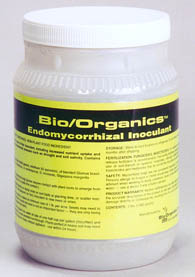Mycorrhizae
It’s just not natural to grow plants without Mycorrhizae!- Nearly all plants have a beneficial association with a type of mycorrhizal root fungus that help them gather nutrients from the soil. With the help of mycorrhizae, a plant can uptake ten times more nutrients.
- Over millions of years, most plants turned the job of gathering nutrients over to their mycorrhizal partners, especially those plants with a relatively inefficient root system. Asparagus, artichokes, avocado, citrus, grapes, melons, peppers, roses, and tomatoes are a few examples of plants with mycorrhizal-dependent root systems. - If a dependent plant lacks mycorrhizae, then growers have to load the soil with "luxury" levels of nutrients. This heavy feeding is expensive and can damage the biological, chemical, and physical health of the soil. - Mycorrhizae can help protect plants against many diseases, including Phytophthora, Fusarium, and Pythium. The mycorrhizal fungi also regulate the uptake of soil toxins, allowing plants to better tolerate salty or other problem soil conditions. - Above ground, damaging insects are generally less attracted to healthy plants. Improved plant nutrition should be the key starting point for Integrated Pest Management programs. - The fungal species in BIOTERRA PLUS inoculant are well-suited to a wide variety of soils, climates, and plants. Some of these species are adapted to high or low pH conditions, some associate strongly with grape vines, citrus, fruit trees, or ornamentals, and some are capable of supporting plant growth in severely degraded soils. BIOTERRA is unique - no other product contains this mix of endomycorrhizal fungal species produced under such carefully controlled conditions. |
Services |
Company |
|

